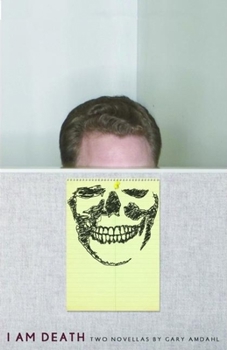I Am Death: Two Novellas
Select Format
Select Condition 
Book Overview
Exploring the paranoia and bravura of the modern American male, these powerful novellas depict a realm marked by faltering blunders, misguided intentions, and the fear of failure. At once comical and terrifying, "I Am Death, or Bartleby the Mobster" charts the slumped career of a muckraking journalist, Jack, who has managed to attract the attention of Frank Fini, one of Chicago's great mob bosses. Fini wants to hire Jack...
Format:Paperback
Language:English
ISBN:1571310711
ISBN13:9781571310712
Release Date:May 2008
Publisher:Milkweed Editions
Length:216 Pages
Weight:0.60 lbs.
Dimensions:0.5" x 5.7" x 8.4"
Customer Reviews
1 rating
I Am Death
Published by Thriftbooks.com User , 16 years ago
Gary Amdahl's I Am Death collects two novellas, the crime story "I Am Death, or Bartleby the Monster (A Story of Chicago)" and "Peasants," a tale of hostile office politics. The two novellas are strikingly different in setting and tone, allowing Amdahl to display a range of abilities as both a writer and a storyteller. "I Am Death" is reluctantly narrated by Jack, a Chicago journalist, who declares at the onset: "this is a story I am compelled to report. I don't want to, I'm tired of banging my head against the wall, no one I know is the least bit interested in cause anymore, effect is everything." It is a statement that at first seems at odds with the story he relates, which begins when Jack is contacted by George Swanson, lawyer for the brutal mobster Frank Fini. The men commission Jack to write Fini's biography, but Jack soon finds that Fini's presence is as catatonic and reserved as the Melville character that lends his name to the novella's title, the mobster preferring that Swanson speak for him on every topic. Jack and Swanson are both sharply self-absorbed, an attribute that is a source of both introspection and delusion. Both are given to grand pronouncements and grander aspirations: Jack writes notes to himself ripe with self-predicating sentiments such as "am going to pieces in a calm and methodical way" while simultaneously convincing himself that this is the story that will finally take his career to the next level. Swanson too prefers speeches to open dialogue. He makes a variety of overreaching statements, such as when he compares his life in organized Chicago crime to Al Jolson's days as a blackface singer, saying, "Guy spends his whole life being someone else--but those were different times. My point is, if you can't be who you are, you be whoever you can be, whoever your audience will let you be. They couldn't be Jews so they put on blackface. See, this is George Swanson in mob face." The tension between Jack and Swanson is offset and reflected by Jack's relationship with Henrique Friend, a driver for the city morgue and the subject of the newspaper article that originally brought Jack to Swanson's attention. It is Henrique's job to drive the van that picks up the city's deceased and transports them to the morgue. Depressed with his work, he tries to kill himself only months before being interviewed by Jack, explaining that dealing with the dead makes him feel helpless: "like I'm late, I missed it, there's nothing you can do. You figure out how to be here and you get used to it." This last sentence is close to the heart of this novella, a single phrase that provides one way to judge these characters. On one side are those who have become part of this world, who have compromised themselves in order to be successful. On the other side are those who have not or cannot, and who will therefore be destroyed by their inability to live with the nature of their lives. In "Peasants," protagonist Walter Rasmussen is an up-and-com





